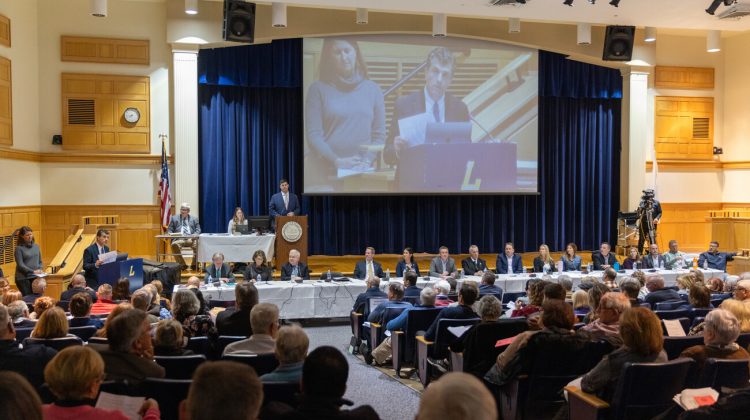LYNNFIELD — Residents packed the middle school auditorium, leaving standing room only, at the Special Town Meeting last Wednesday. All seven articles, ranging from MBTA zoning law compliance to approving the refurbishment of athletic fields, passed.
The fourth article was the most comprehensive and passed with a majority vote. It will add a Multifamily Overlay District to the zoning bylaws in accordance with a controversial state law that applied to all MBTA communities. The Select Board, Finance Committee, Planning Board, and the MBTA Zoning Advisory Committee all supported it.
With the article passing, three new subdistricts will be designated throughout Lynnfield. One is located at the Market Street Apartments, another is the Broadway North area, and the third is the Broadway South area. These three locations comply with the law, but won’t necessarily have any new units built on them.
Leading up to the vote, Select Board Chair Dick Dalton laid out what this Multifamily zoning would entail, in particular emphasizing the implications of not complying with the state’s mandate. This would include the loss of significant funding, which Dalton stressed by listing out grants that the town would lose if they didn’t comply with the zoning bylaw.
Concerned residents also voiced their concerns about what these new Multi-Family Overlay Districts could mean for the community.
“I would think 150 units would probably yield at least one student per unit. DESE’s per pupil expenditure right now in Lynnfield is $18,000 per student, so that’s $2.7 million a year,” resident Michelle Cole said.
Resident Michael Walsh moved to postpone the article indefinitely, arguing, “the state’s law and its guidelines are still under review. So I think let the legal process follow its way out and see what happens.” He also cited other towns who have decided to postpone compliance with the zoning law.
However, Town Counsel Tom Mullen responded that the Supreme Court review of the guidelines is just “a speed bump” for the state implementing the act.
Resident Patrick Curley supported the article and highlighted how the town “has these three parcels where it doesn’t really make a dramatic change to how life exists in Lynnfield.” He also made a point of the legal expenses it would cost taxpayers if they voted against passing the article, an argument that earned Curley applause and led into a majority “yes” vote.
An article to appropriate $18.3 million for a large-scale renovation of the Lynnfield Public Library proved to be even more contentious with plenty of debate amongst residents. After going to a hand count, the article passed with 305 voting in the affirmative and 89 voting in the negative.
Along with fixing numerous longstanding maintenance issues, the project will add spaces to the building such as a teen room and a private meeting room.
The article received support from a number of residents involved in the education system. Resident Jonna Casey, an assistant principal and project director for Boston Public Schools, said, “A library is essential to any community. It’s not just want but a serious, a very serious need.”
Others were less supportive of the large price tag that would come with this project, including members of the Finance Committee, which did not recommend passing this article.
“It’s not that I wouldn’t love to have a new library. Fiscally, it’s just not responsible at this time. I’d look at other options,” resident Steven Riley said.
The next article similarly dealt with allocating money for an extensive project, this one appropriating $12.85 million for a ten-year roadway improvement program. It narrowly passed with a two-thirds majority of 194 votes in the affirmative to 95 votes in the negative.
Director of Public Works John Scenna presented the work done by himself, Town Engineer John Tomaz, and Beta Engineering to study Lynnfield roadways and what needs to be done to them.
“If we’re able to increase our roadway program to a level of $2 million dollars a year for a period of ten years … our roadway ranking will go from the bottom of what Beta sees in communities to the top of the range where Beta sees in communities,” Scenna outlined.
This outline would request a 10-Year Capital Debt Exclusion Borrowing equal to $1,285,000 per year for 10 years, which would result in a tax increase equal to $258 for the average assessed home in Lynnfield over the coming decade.
Some residents were concerned about how much this project would be costing them.
Resident Bob Prosperi asked, “Is there a compromise? Is there a way of not spending all of this money and spending some of it? Because in my opinion, if we’re going to vote on that $13 million over ten years, I personally am gonna vote no.”
Others, such as resident Steve Grasso, were more supportive of the article, emphasizing the importance of road infrastructure in the function of a town.
“You can’t get to a library or to a school if you can’t drive down it or your kids can’t ride a bike down a sidewalk,” Grasso argued, spurring applause from the crowd.
The first two articles concerned general allocation of funds to pay overdue bills from the prior fiscal year and to supplement certain accounts in the current 2025 fiscal year. Article 3 transferred funds from the Recreational Capital Trust for the refurbishment and improvement of athletic fields. The last article of the meeting was an amendment to Chapter 143 of the General Bylaws that added a “Fee Schedule” for weights and measures.

